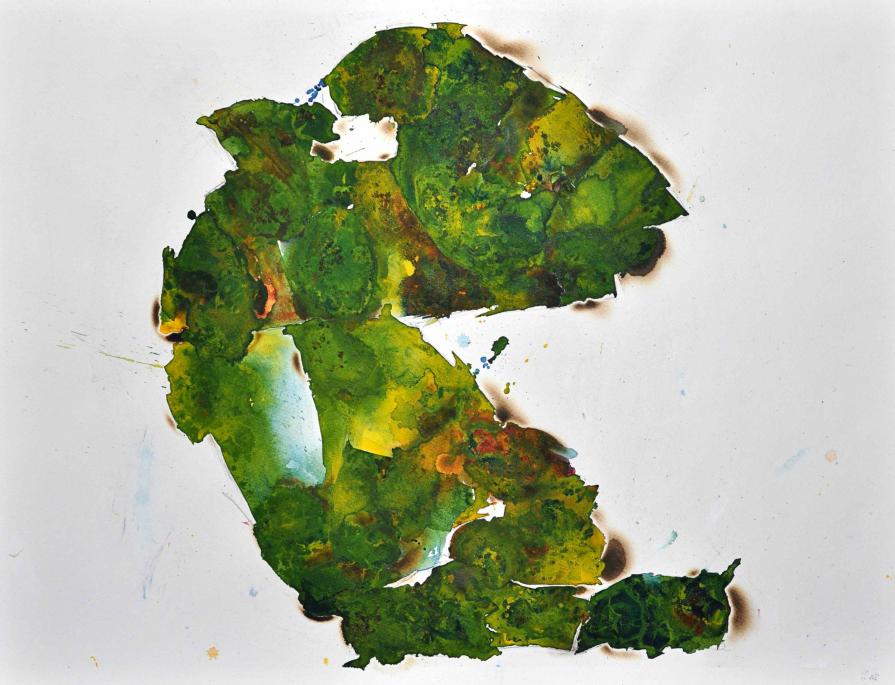Ashes to Ashes I
With his series ‘Ashes to Ashes’ the artist is searching for a new type of realism. A realism in line with the values and movements of our century. Therefore he developed new painting methods and additional concepts. This results in an objective representation where he reduces the ‘human aspects’ that are common for the traditional realistic paintings. Traditional realism is based on aspects of illusion, the realism this artist proposes is based on facts in line with the developments of our century. He reduces illusionistic aspects just like abstract paintings but without reducing its realistic quality.
The painting shown here is an interpretation of a cartographic image of our world a few million years ago (Pangea). In order to recreate this shape the artist first of all asked himself the following question: "which entity is most responsible for the shape of our world?" The answer, without going in too much detail, is temperature.
In order to create this image, to shape the world, the artist decided to bring the painting method as close as possible to the method 'nature itself' used to shape our world. He decided to replace the traditional brushes with temperature. The painting method that he developed out of this thought is an authentic and new method exclusively used by this artist. The image is a 'wet in wet watercolor’ made with fire (+-1500 °c), Further it is also worth mentioning that the painting is made out of the three basic components of color (red, yellow and blue), just like our earth that is made out of simple basic elements.
It needs no explanation that the method an extremely rare and interesting form of realism generates. For example the craters/silent volcano’s that you can see on the image are a document of volcano's that actually originated while painting because of the high temperatures that are used.
The title 'Ashes to Ashes' of course refers first of all to the cycle of life where every form of matter eventually returns to its original state, all states in between are nothing but temporarily. And secondly, because the creative process is very similar to any form of destructive process, which high temperatures in the form of fire most of the time are, is the creative act a balance act between destruction and creation. Thereby providing a blink towards our modern society that for some reason seems to be very good at the destructive side of this balancing act, the destroying of our environment.
I will not go in detail into the painting method but it is important to understand a part of it in order to feel the complexity of the technique. As said above, the brushes are replaced with temperature. The artist didn’t touch the paper/painting (with any tool) at any point except for the drawing underneath the painting, while painting he only manipulated the picture with temperature. This painting is a ‘wet in wet’ painting painted in one moment (in one moment that means no multiple drying processes, no multiple layers added after drying). Normally it’s impossible to generate a lot of structure within a ‘one moment wet in wet’ watercolour painting, but with the techniques that the artist developed it is possible to combine a lot of structure with this beautiful ‘wet in wet’ atmosphere
Enjoy!
dries
PS: This style of painting is very dangerous (don't try this without the essential knowledge). The methods needed to paint these paintings are protected with patents!
Pss: The artwork 'Origin' on this website (one of the selected artworks of celeste prize 2014) is also part of this series 'Ashes to Ashes'. (same technique and concept is used)



















Comments 1
Say something